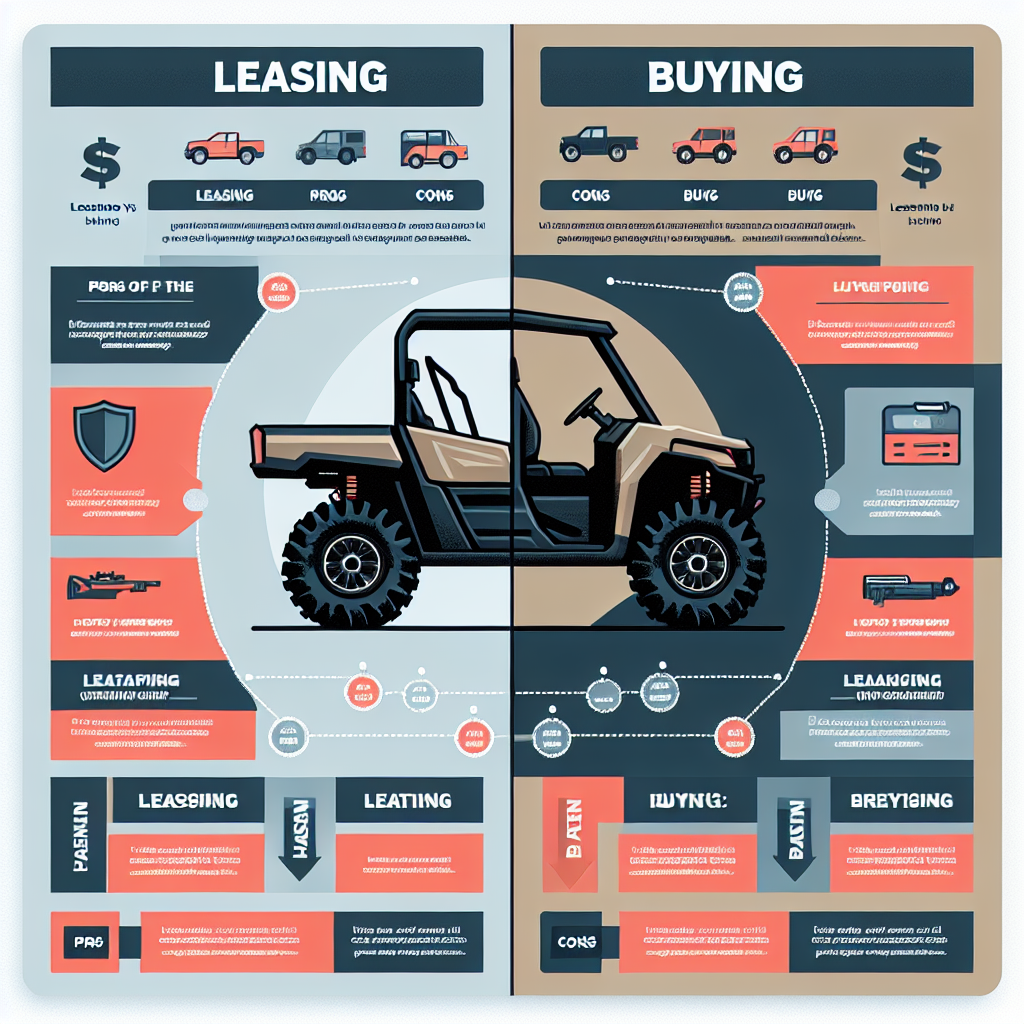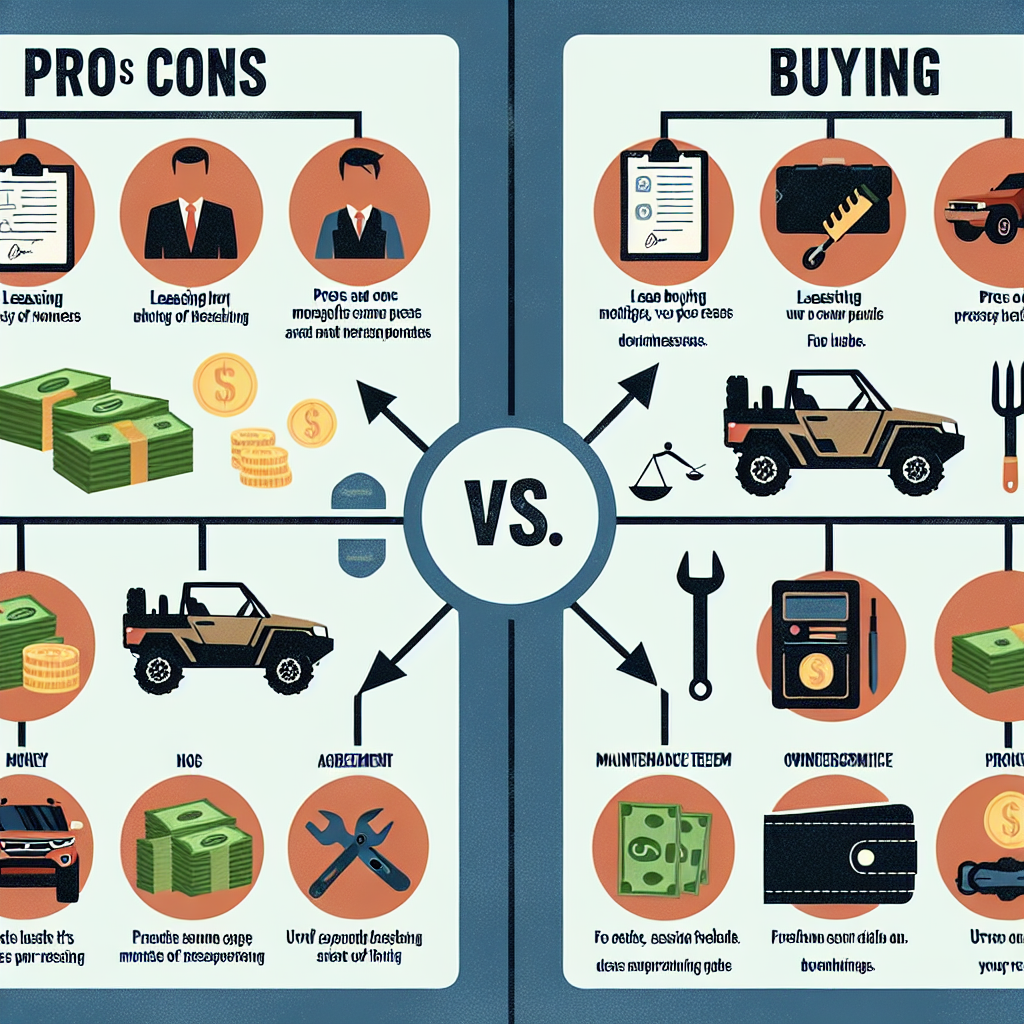Should You Lease or Buy a UTV? Pros & Cons

-
Table of Contents
“Lease or Buy a UTV: Weighing the Pros and Cons for Your Adventure Needs!”
When considering whether to lease or buy a UTV (Utility Task Vehicle), it’s essential to weigh the pros and cons of each option. Leasing offers lower upfront costs and the ability to drive a new model every few years, making it appealing for those who prefer the latest technology and features. However, leasing may come with mileage restrictions and potential fees for excessive wear. On the other hand, buying a UTV provides ownership, allowing for unlimited use and customization, but it requires a larger initial investment and ongoing maintenance costs. Understanding these factors can help you make an informed decision based on your needs and financial situation.
Leasing a UTV: Advantages and Disadvantages
When considering whether to lease or buy a Utility Task Vehicle (UTV), it is essential to examine the advantages and disadvantages of leasing. Leasing a UTV can be an attractive option for many individuals and businesses, particularly those who prioritize flexibility and lower upfront costs. One of the primary advantages of leasing is the reduced initial financial burden. Unlike purchasing a UTV, which often requires a substantial down payment, leasing typically involves lower initial costs, making it more accessible for those who may not have the capital to invest in a new vehicle outright. This lower barrier to entry allows users to access high-quality UTVs without the immediate financial strain associated with buying.
Moreover, leasing often includes maintenance and warranty coverage, which can significantly reduce the overall cost of ownership. Many leasing agreements come with service packages that cover routine maintenance, repairs, and even tire replacements. This aspect can be particularly beneficial for those who may not have the time or expertise to handle maintenance tasks themselves. Consequently, lessees can enjoy peace of mind knowing that their UTV is well-maintained without incurring additional expenses.
In addition to financial considerations, leasing provides flexibility in terms of vehicle choice. As technology and models evolve rapidly, leasing allows users to drive the latest UTVs without committing to a long-term purchase. This is particularly advantageous for businesses that require specific features or capabilities that may change over time. By leasing, companies can adapt to their needs more readily, ensuring they always have access to the most suitable equipment for their operations.
However, despite these advantages, there are notable disadvantages to leasing a UTV that potential lessees should consider. One significant drawback is the lack of ownership. At the end of a lease term, the lessee must return the vehicle, which means they do not build any equity in the UTV. For individuals or businesses that plan to use a UTV for an extended period, this can be a disadvantage, as they will ultimately have to either lease again or purchase a vehicle, incurring additional costs.
Furthermore, leasing agreements often come with mileage restrictions and wear-and-tear policies. Exceeding these limits can result in additional fees, which can add to the overall cost of leasing. For those who intend to use their UTV extensively, these restrictions can be limiting and may lead to unexpected expenses. Additionally, lessees may face penalties for modifications or customizations, which can be a significant consideration for users who wish to personalize their vehicles for specific tasks or preferences.
Another factor to consider is the long-term cost implications of leasing versus buying. While leasing may seem more affordable in the short term, over several years, the cumulative cost of multiple leases can exceed the cost of purchasing a UTV outright. Therefore, individuals and businesses must carefully evaluate their usage patterns and financial situations to determine which option aligns best with their needs.
In conclusion, leasing a UTV offers several advantages, including lower upfront costs, maintenance coverage, and flexibility in vehicle choice. However, potential lessees must also weigh the disadvantages, such as the lack of ownership, mileage restrictions, and long-term cost considerations. By thoroughly assessing these factors, individuals and businesses can make an informed decision that best suits their requirements and financial circumstances.
Buying a UTV: Pros and Cons
When considering the acquisition of a Utility Task Vehicle (UTV), potential buyers often grapple with the decision of whether to lease or purchase. Focusing specifically on the option of buying a UTV, it is essential to weigh the advantages and disadvantages to make an informed choice. One of the most significant benefits of purchasing a UTV is ownership. When you buy a vehicle, it becomes an asset that you can modify, customize, and use as you see fit. This freedom allows for personal expression and the ability to tailor the vehicle to meet specific needs, whether for recreational use, work, or both.
Moreover, owning a UTV can be financially advantageous in the long run. While the initial cost may be higher than leasing, once the vehicle is paid off, the owner is free from monthly payments. This can lead to substantial savings over time, especially if the UTV is used frequently. Additionally, owning a UTV means that you are not bound by mileage restrictions, which are often imposed in lease agreements. This flexibility is particularly beneficial for those who plan to use their UTV for extensive off-road adventures or work-related tasks that require significant travel.
However, it is crucial to consider the potential downsides of purchasing a UTV. One of the primary drawbacks is the upfront cost. Buying a UTV typically requires a substantial initial investment, which may not be feasible for everyone. This financial commitment can be daunting, especially for those who are uncertain about how often they will use the vehicle. Furthermore, the depreciation of the UTV’s value over time is another factor to consider. Like most vehicles, UTVs lose value as they age, which can be a concern for buyers who may want to sell or trade in their vehicle in the future.
In addition to depreciation, maintenance and repair costs are also important considerations when buying a UTV. As the owner, you are responsible for all upkeep, which can add to the overall expense of ownership. Regular maintenance is essential to ensure the vehicle operates efficiently and safely, and unexpected repairs can arise, leading to additional financial burdens. This aspect of ownership can be particularly challenging for those who may not have the mechanical knowledge or resources to handle repairs themselves.
Another point to consider is the potential for limited flexibility. Once you purchase a UTV, you are committed to that specific model and configuration. If your needs change or if new models with advanced features become available, you may find yourself stuck with a vehicle that no longer meets your requirements. In contrast, leasing often allows for more frequent upgrades, enabling users to take advantage of the latest technology and improvements in UTV design.
In conclusion, buying a UTV presents both advantages and disadvantages that must be carefully evaluated. The benefits of ownership, such as customization, long-term savings, and unrestricted use, are compelling reasons for many buyers. However, the initial financial commitment, ongoing maintenance responsibilities, and potential for depreciation are significant factors that can complicate the decision. Ultimately, prospective buyers should assess their individual needs, financial situation, and intended use of the UTV to determine whether purchasing is the right choice for them. By weighing these pros and cons thoughtfully, individuals can make a decision that aligns with their lifestyle and budget.
Financial Considerations: Leasing vs. Buying a UTV
When contemplating the acquisition of a Utility Task Vehicle (UTV), one of the most significant decisions revolves around whether to lease or buy. Each option presents distinct financial implications that can influence not only the immediate budget but also long-term ownership costs. Understanding these financial considerations is crucial for making an informed decision that aligns with your needs and financial situation.
Leasing a UTV typically requires a lower initial investment compared to purchasing. This is primarily because leases often involve a down payment that is significantly less than the full purchase price. Consequently, for individuals or businesses with limited cash flow, leasing can provide an attractive entry point into UTV ownership. Additionally, monthly lease payments are generally lower than loan payments for a purchased vehicle, which can free up capital for other expenses or investments. This aspect makes leasing particularly appealing for those who may need a UTV for a short-term project or seasonal use, as it allows for flexibility without the burden of a long-term financial commitment.
On the other hand, buying a UTV entails a higher upfront cost, which can be a barrier for some buyers. However, ownership comes with its own set of financial advantages. When you purchase a UTV, you build equity in the vehicle, which can be beneficial if you decide to sell or trade it in later. Moreover, once the vehicle is paid off, you are no longer obligated to make monthly payments, which can lead to significant savings over time. This is particularly relevant for those who plan to use the UTV extensively or for an extended period, as the long-term cost of ownership may ultimately be lower than leasing.
Another financial consideration is the potential for depreciation. UTVs, like most vehicles, lose value over time. When leasing, the lessee is typically only responsible for the depreciation that occurs during the lease term, which can be advantageous. Conversely, when you buy a UTV, you bear the full brunt of depreciation, which can be a significant factor if you plan to sell the vehicle in the future. Understanding the expected depreciation rate of the specific UTV model you are considering can help inform your decision, as some models retain their value better than others.
Insurance costs also differ between leasing and buying. Leased vehicles often require comprehensive insurance coverage, which can increase monthly expenses. In contrast, owners may have more flexibility in choosing their insurance coverage, potentially leading to lower costs. However, it is essential to consider that while leasing may seem more affordable in the short term, the cumulative costs over the lease period can add up, especially if you frequently lease new models.
Ultimately, the decision to lease or buy a UTV hinges on individual financial circumstances and usage requirements. For those who prioritize lower initial costs and flexibility, leasing may be the more suitable option. Conversely, for individuals or businesses that plan to use a UTV extensively and seek long-term value, purchasing may prove to be the wiser financial choice. By carefully weighing these financial considerations, prospective UTV owners can make a decision that best fits their budget and usage needs, ensuring that their investment aligns with their overall financial strategy.
Q&A
1. **Question:** What are the pros of leasing a UTV?
**Answer:** Leasing a UTV typically requires a lower upfront cost, allows for access to newer models with the latest features, and provides flexibility to upgrade every few years.
2. **Question:** What are the cons of buying a UTV?
**Answer:** Buying a UTV involves a higher initial investment, potential depreciation in value, and ongoing maintenance costs that can add up over time.
3. **Question:** What are the pros of buying a UTV?
**Answer:** Buying a UTV offers ownership, no mileage restrictions, the ability to customize, and the potential for long-term savings if used frequently.Leasing a UTV can offer lower monthly payments and the opportunity to drive a new model every few years, making it appealing for those who prefer flexibility and lower upfront costs. However, it often comes with mileage restrictions and no ownership at the end of the term. Buying a UTV provides full ownership, allowing for unlimited use and customization, but requires a larger initial investment and ongoing maintenance costs. Ultimately, the decision to lease or buy a UTV depends on individual financial situations, usage needs, and personal preferences regarding ownership and flexibility.





